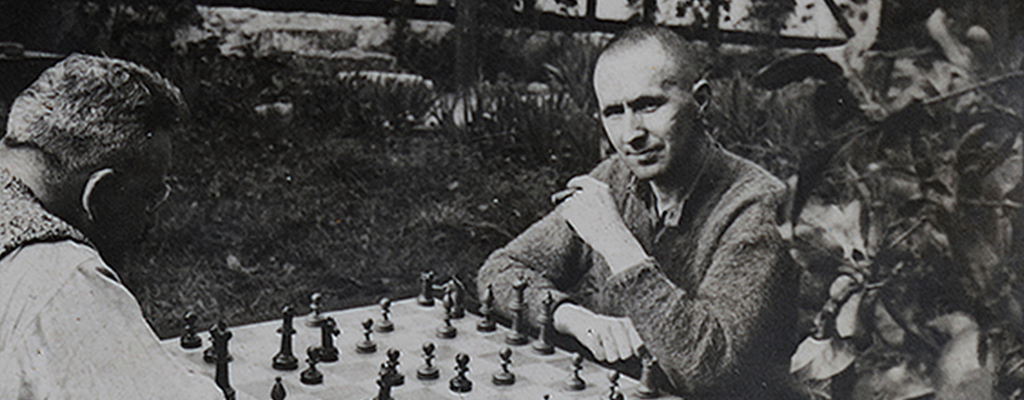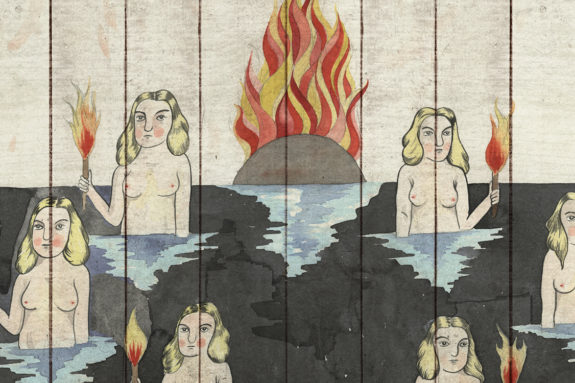A public poet who rarely published, Brecht wrote in isolation and exile smoldering poems for a revolutionary readership who had not yet arrived.
The Collected Poems of Bertolt Brecht
Bertolt Brecht Liveright | $49.95 1312 pages
In 1938, the eve of war in Europe, Bertolt Brecht was living in an exile as close as he could manage. Having fled Germany in 1933, the day after the Reichstag fire, Brecht and his family had alighted in Svendborg, Denmark, not far from the German border. From the Brechts’ home they could hear the exercises of Nazi warships. Playwriting continued, though it would be years before Brecht had a chance to stage his creations. But Brecht was writing poetry, as he would his entire life, at a frenetic rate, making his inactivity and discomfort his subject:
This morning early, Easter Sunday
There was a sudden snowstorm over the island.
Snow lay in between the greening hedges. My young son
Fetched me out to a little apricot tree against the wall of the house
Fetched me from a line of verse in which
I was pointing the finger at men preparing a war in which
The continent, this island, my people, my family and I
May be erased. In silence
We laid a sack
Over the freezing tree.
The horrors of Europe notwithstanding, Brecht’s eye is trained on nature: he can’t help but observe the change of seasons, the workings of his garden. Another poem from the same period is suggestively titled “Bad time for poetry.” His difficulty demonstrates a common struggle of “using one’s voice” in a world of impersonal destruction. How can we exercise our own subjectivity and write about the things nearest to us, while confronting what seems like a huge and absurd gap between these impressions and our knowledge of injustice, war, disaster, and death? Especially when the source of poetry’s power seems to come from the vividness of unmediated experience?
An English-language reader is more likely to know Brecht for his plays. Or perhaps even more likely, for “Brecht” the theory—particularly Verfremdungseffekt, or the “estrangement effect” as it’s sometimes translated. “Brechtian” is now a shorthand for anything unfamiliar, but the word condenses a massive, lifelong program for reimagining theater, one that relies on a fundamentally optimistic vision of the audience: that reflection and thinking can be transformed into sources of pleasure greater than passively losing oneself in escapist spectacle, and that this pleasure was prerequisite for politics. The gradual development of this new aesthetic tracks Brecht’s life: the wild youth of expressionist dramas like Baal, the decadent Berlin years of The Threepenny Opera, the exilic, political knots of later dramas like Galileo and The Caucasian Chalk Circle. His search for a socially engaged theater mirrors a continuing recreation of his self.
The Collected Poems of Bertolt Brecht then serves as another vantage point, and a reintroduction for English readers to Brecht’s poetic efforts. David Constantine and Tom Kuhn’s translations add to the out-of-print Poems 1913–1953 (which, if you can find a copy, has good translations worth comparing). More than twelve hundred poems are collected, though Brecht is known to have written over two thousand. Poetry was his first love in literature, and central to his writerly practice.
This raises a natural question: if the poems are so good, why are they relatively littleknown? This is sometimes attributed to the difficulty of translating poetry, that old excuse. But it also represents a difference in values. Brecht’s mature style is spare, polemical, often satirical. Images can at times be scarce. Further, if Ezra Pound and T.S. Eliot (no progressives by anyone’s estimation) are at the center of modern Anglophone poetry’s foundation myth, the difference is intensified. For many, the act of disavowing political commitment to uphold “pure” aesthetic achievement has become so ingrained as to become a habit of mind. That Brecht not just addresses politics straightforwardly, but also makes communist politics the great subject of his work, is something prone to be thought of as retrograde or coarse.
Fortunately, this isn’t the case, though not every poem is a great one. But the innovations are quieter, more difficult to trace. There’s a wiliness to the work: you’re given something “straight,” but are also asked to consider its contradictions. Initially simple observations deepen with attention. “Epic theater,” maybe all theater, births a temporary community, a readymade political gathering where together everyone watches the actor make decisions of interpretation. Its tradition, from Greek tragedy to the morality play, is ripe with instruction. But the didactic mode in poetry has long been in retreat, and perhaps this has to do with a poverty of institutions: readings exist, but the cultural experience of poetry for most is largely one of private reading. And we don’t necessarily want to be lectured when we’re by ourselves. How, then, to inject the social back into the solitary lyric? Brecht’s approach is egalitarian in thought: attempt everything, and thereby show that there is no one “underlying” register that is “poetic.” As he puts it, “A man with one theory is lost. He needs several of them, four, lots!”
Fredric Jameson observes Brecht’s love of active quotation (the actor is asked to deliver lines both in the first and the third person, a kind of performance italics), remarking that his technique is “better read not as a refusal of identification but, rather, as the consequences to be drawn from the fact that such a thing never existed in the first place.” This separation exists in the poetry too: we have the idyll of protecting the apricot tree, but also an awareness that this is a certain kind of nature poem among other registers. Our subjectivity, which seems so immense to us, is put into perspective. The lyric isn’t abolished, but is rather one more tool, another attitude held up for examination:
Exclusively because of the increasing disorder
In our cities of class struggle
Some of us, these years, have decided
No longer to speak of harbour towns, snow on the roofs, women
The smell of ripe apples in the cellar, the sensations of the flesh
All that makes man round and human
Even what seems like a straightforward proclamation evokes what it denies. Is this negation serious, or a persona, or simply a way of airing the idea and letting the reader mull it over? Maybe all three.
Brecht’s desires—to enjoy and to contradict—remain remarkably constant over his career, even as his method is fluid. A sickly child (an infection left him with an enlarged heart, a metaphor he readily internalized), Brecht as a young man came to fetishize the “appetite” that he felt he lacked. He grew up through World War I, the Spartacist Uprising, and the Weimar Republic, ruptures that completely discredited the conventional values of the time. The result is poetry that expresses no principles beyond survival and the enjoyment of what’s left—an attitude that is not unfamiliar in the relentless novelty and atomization of late capitalism.
The “Hauspostille,” or “Domestic Breviary,” as it’s translated here, is Brecht’s first major poetic achievement and a testament of this period. It’s an antic catalogue of a fallen world: infanticides, drunks, sexual conquests. Pre-communist, its pursuit of stimuli is the root of Brecht’s idea of poetry as popular enterprise. The song or ballad is dominant, and though the refrains can tire a contemporary reader, the form would serve Brecht his entire life: catchy, clearly reiterating its themes, and able to be sung together by a group. In the late twenties, Brecht befriended unorthodox Marxists like Walter Benjamin and Karl Korsch, and Brecht’s discussions in these circles spurred his radicalization (though he remained an unsystematic thinker to the end, never joining any party). A new belief that people could live well if the world were organized otherwise is also a reclaiming of Weimar’s earthly delights: food, shelter, and enjoyment come to be thought of as possessions that should be universal. When it has become bad taste to speak of injustice, Brecht argues, then it is the aesthetic that is faulty. A new speech is required, one that everyone can participate in.

Although the idea that social conditions are man-made and can be changed becomes a constant refrain of the later work, the variety of forms this takes is dizzying, from reflections on the Chicago wheat market, to exhortations to sabotage, to epitaphs for himself and for Rosa Luxembourg. As relatively little of the poetry was published in Brecht’s lifetime, its functionally private nature made it into a workshop, a lyric thinking space where Brecht digested his impressions into art. He compulsively produced new fragments, sketches, dirty sonnets for lovers, verse commentaries on his own plays, and abortive projects which were maybe always impractical (like his plan to create a versification of The Communist Manifesto).
Privacy also opened a space to express doubts—in public Brecht often self-censored, for example offering continued support for Stalin even as he recognized his failings. Poems like “Are the People Infallible?” show misgivings about the execution of his friend Sergei Tretyakov. And in the late “Buckow Elegies,” masterful studies in compression, Brecht’s impressions of the 1953 uprising against the East German government are largely disapproving, as in the famous sarcastic remark “would it not / Be simpler if the government / Dissolved the people and / Elected another one?” Would it have been better if he had spoken up publicly? Perhaps so, but Brecht’s long exile had conditioned him to prioritize survival first. Still, some realizations would escape even the master dialectician: multiple collaborators (usually women, like Elisabeth Hauptmann and Margarete Steffin, with whom he was romantically entangled) that worked tirelessly for him are largely uncredited. In this way, he resembles a traditional patriarch of the world into which he was born, or the “man of genius” who controls everything, even as he seeks a new language of community.
Another old poetic habit rendered new in his work is a paradoxical sense of writing for eternity while still writing for the present. Instead of an immediate audience, poetry is available to anyone who encounters it anytime, anywhere, simply by opening the book—a radical indeterminacy between speaker and listener. There are a considerable number of poems addressed to posterity, usually apologies for the shortcomings of the currently alive:
Our powers were feeble. The goal
Lay far in the distance
It was clearly visible even if, for me
Hardly attainable.
Though there is a melancholy to this, the reversal is still present: it consciously invokes the time in which a better world has been achieved. With the faith of a believer, present failure is admitted with the assurance of future victory.
In this spirit of casting ahead, maybe the idea of Brecht is always somewhat greater than the reality: the possibilities and pathways are often as suggestive as the poems themselves. To read his poetry is to be drawn into his workshop, where you see the blueprints and marvel, even if some works are not fully executed (or like his Galileo, boxed in by himself and his times, his work secreted across the border by a disciple). He is the poet of the pleasure of starting anew, of fresh possibility, as he writes in one late poem:
O joy of beginning! O early morning!
First grass, when we’ve all but forgotten
What green is! O first page of the book
Awaited, full of surprise!
All of this leading to: “And you, / New thought!”
But as deeply pleasurable as beginning is, Brecht also understood that no development is inevitable, neither change nor status quo, neither innovation nor the strength of tradition. The effort to build a new world would be long and difficult. At the war’s height, in a new phase of American exile, his meditations on contradiction continued: “New epochs do not begin all at once . . . From the new antennae came the old stupidities. / And wisdom was passed from mouth to mouth.” America fascinated Brecht from afar as another great appetite, but in person he found it unfriendly and alienating. Another estrangement, another failure, another reinvention. Brecht’s strength is to reveal that what we think we know always has another revolution within it. He reminds us of this constant change, because we need reminding, and assures us that there will be a place for singing within it.





